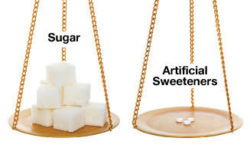Are you someone who had forgone natural sugars in favor of artificial ones? Are you feeling happy that you can now indulge your sweet tooth without loading your body with calories? Well, you may just be setting yourself up for disappointment.
The actual benefits, if any, of artificial sweeteners, are debatable. The first artificial sweetener, Saccharin, was produced in 1878. Since then, there have been extensive studies to determine if there are any provable benefits of artificial sweeteners. Thus far, no such benefits have been identified. In fact, far from having any benefits, the use of artificial sweeteners have been found to be detrimental to the body in a number of ways.
Read on to learn more about these ‘hidden dangers’ of artificial sweeteners, so that you can make an informed choice regarding whether or not to use them in the future.
They tire the taste buds
The sweetness levels of these artificial sweeteners is many times more than the sweetness levels of fruits. To put it into perspective, Stevia is hundred times sweeter, sucralose is 600 times sweeter, neotame is over 7000 times sweeter. What happens when you take sweets at such a high dose? The answer is simple – the taste bud receptors for sweets have to work excessively, and over a period of time become insensitive to the natural taste of sugar. This is because the receptors have become tired. When this happens, you need to consume even more sugar to feel the same taste.
Sweeteners affect the brain-gut axis
When you put something sweet in your mouth, the taste receptors send signals to the brain, asking the gut to prepare itself for some high-calorie food. So the gut, along with its glands and enzymes, prepare for a huge load to digest; but that load never comes. When this repeatedly happens, your gut stops taking these signals seriously. In the long run, this adversely affects your metabolism.
Interferes with the normal synthesis and functioning of insulin
This is basically an extension of the previous point. The pancreas senses sweetness and releases insulin. But when no sugar actually enters the blood, the insulin remains in the blood without serving any purpose. When this occurs for weeks and months, the insulin eventually becomes insensitive to normal sugars.
Prevents the production of GLP-1
GLP-1 is a hormone that controls the level of sugar in the blood and enables you to experience early satiety. Artificial sweeteners actually hinder the function of this hormone and lead to late satiety. As a result, you will consume more sugars than is required, and thus load your body with unnecessary calories.
Artificial sweeteners reset your appetite
Using artificial sweeteners for a long time leads to the resetting of the appetite centers in the brain.
Artificial sweeteners lead to overeating
The resetting of appetite levels will ultimately lead to overeating and excessive snacking. When this is coupled with the deceptive psychological comfort zone that having artificial sweeteners puts you in, your consumption becomes all the more unhealthy and calorie-heavy.
Increases the body weight
As a consequence of resetting your appetite centers to higher levels, and resultant excessive eating; you keep putting on weight and adding extra fat around your waist. That’s why people who use these sweeteners and expect to lose weight soon find themselves battling even more pounds. So if you are someone serious about losing weight, you need to reconsider the use of sweeteners.
The risk of diabetes increases

The hampering of the insulin metabolism, along with the increase in body weight, leads to an increased risk of diabetes. You may have noticed that after starting to use sweeteners, you are struggling with even greater blood sugar levels. Manufacturers of artificial sweeteners claim that the use of their products help reduce the risk of diabetes, but there is no scientific evidence that substantiates those claims.
More read: ways to reduce blood sugar
They are not environment-friendly
The amount of sewage that factories manufacturing sweeteners produce is massive. All this sewage has a negative impact on the environment. This is because this sewage takes a long time to disintegrate. It also pollutes water bodies Some studies have demonstrated the presence of sucralose and acesulfame in water bodies even after four years a ban on their manufacturing.
They are genetically modified
Artificial sweeteners are made from genetically modified foods like soy, corn or sugar beets. There are a number of potential ill-effects of GMO’s that are well-documented.
Now that you are a little more aware of hidden dangers of artificial sweeteners, you should seriously consider stopping your use of them and switching to healthier alternatives. Your long-term health goals are compromised when you focus on satisfying your taste buds in the short term.






